Deja Young-Craddock Is Unstoppable
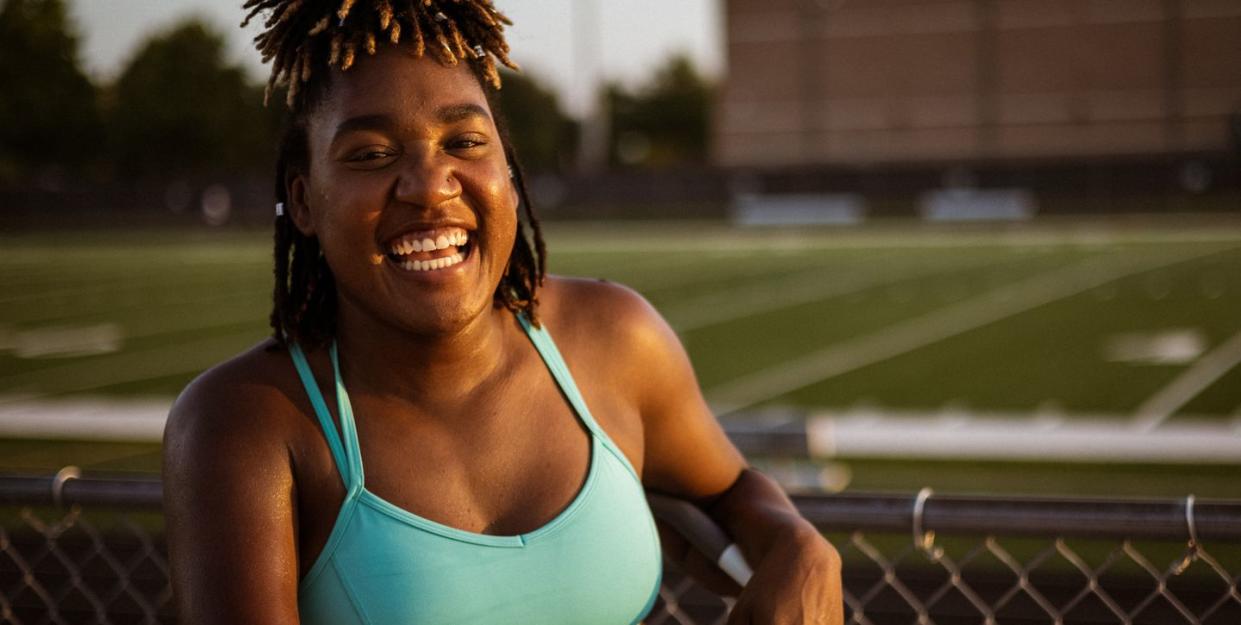
Deja Young-Craddock’s first memory remains sharp: She stands in front of a jury of strangers and unties the strap of her black-and-white sundress to reveal her right shoulder. She is 4 years old.
Deja is there with her parents, Delora and Don, who have filed a lawsuit against the hospital where she was born. In the first year of Deja’s life, her parents had wondered why their new baby would wince at the slightest pressure on her shoulder, why her skin would become mottled with purples and blues all the way down to her forearm, why she couldn’t learn to crawl.
Eventually doctors diagnosed Deja with an injury to her brachial plexus, a network of nerves that control movement and sensation in the shoulder, arm, and hand—the result of a serious birth complication called shoulder dystocia.
The complication can sometimes occur when a small-statured mother gives birth to an above-average-size infant during vaginal delivery, which was likely the case with Deja. But the hospital where Deja was born never communicated the incident to the family. The family sued not only the hospital but also the doctor who delivered her, and the case was eventually settled out of court.
Deja underwent three surgeries before the age of 6 to increase mobility and decrease pain: a muscle transplant, a nerve transplant, and a plastic surgery to ensure that her right arm could rest in a comfortable position. Even in her postoperative casts that made her look like a miniature Statue of Liberty for months at a time, “she always found a way around everything,” says Delora. “Her cast was simply a tool to bounce off things. And she was never without a smile.”
Get unlimited access to more best-in-class features like this one!
While the injury permanently limited Deja’s shoulder mobility, it didn’t inhibit her natural athleticism. And when she found track and field in middle school, there was no looking back. Her determination and speed eventually catapulted her to the 2016 Rio Paralympics and a Tokyo 2020 berth. But along the way, Deja was repeatedly reminded that she was different. She endured insensitive jokes and comments from classmates, coaches, and complete strangers, all of which led to some very dark times.
At her family’s home in Mesquite, Texas, in June, the 25-year-old two-time Paralympic gold medalist reflected on her path to Paralympic success. It’s a testament to her resilience that even as she talks about the litany of challenges she’s faced since birth—circumstances that could bring anyone to choose bitterness over joy, hate over love—the ever-present smile her mother described is indeed still there. “I feel like I was meant to be that person who smiles at someone, and they think, ‘hey, I can survive another day,’” Deja says.
With a twist of her wrist, Deja displays a tattoo on her right forearm that she got back in 2019. “Every tattoo I have has a story behind it,” says Deja, who is also a skilled artist. “On the outside of my arm, I have a sun and moon that I drew. It represents that you can be your own light, you can be your own darkness. I got that one during a tough time. I can get through any time because I’m my own flashlight.”
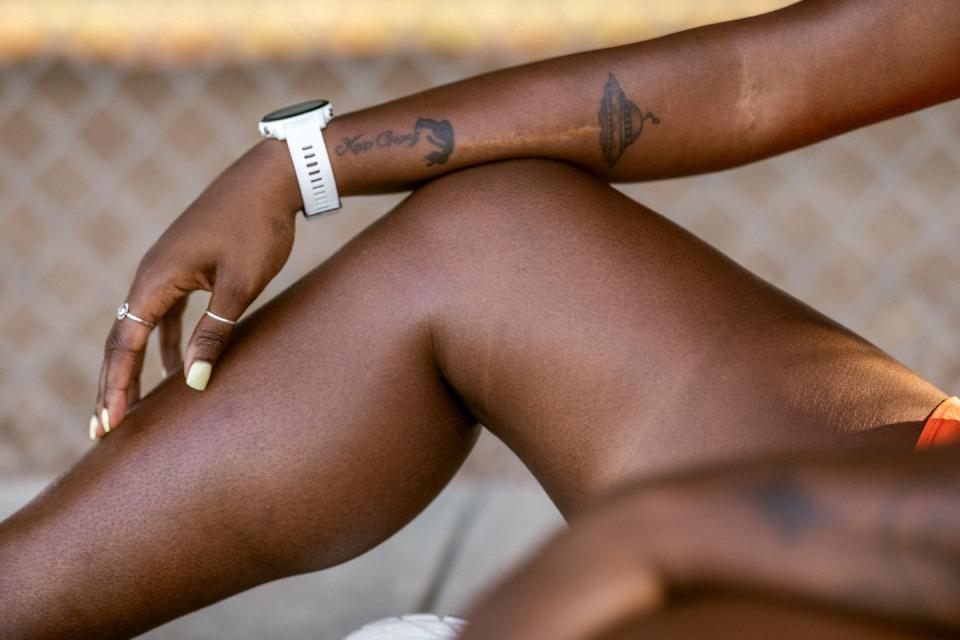
The one on her right forearm depicts an alien connected to a UFO via a beam of light, which is represented by a large scar from one of her surgeries, a mark that has decorated her skin longer than any of her tattoos. The phrase Just Keep Going is inked underneath. “I’m the alien,” Deja says.
The feelings of alienation began in middle school, where classmates bullied her for being different. The taunting confused her; her parents hadn’t framed her injury as a disability, and she didn’t think she was any different from her classmates.
She eventually found solace and community in sports, filling her after-school schedule with basketball, volleyball, and softball. She tried out track for the first time in seventh grade.
While Deja was a naturally gifted sprinter, her speed didn’t translate immediately to success. But she devoted herself to practice. The 400-meter repeat day, the bane of the sprinter’s existence, was a day she looked forward to. When her coach had the team run at cross-country meets, she never complained. “Running was an escape for me for a really long time,” she says.
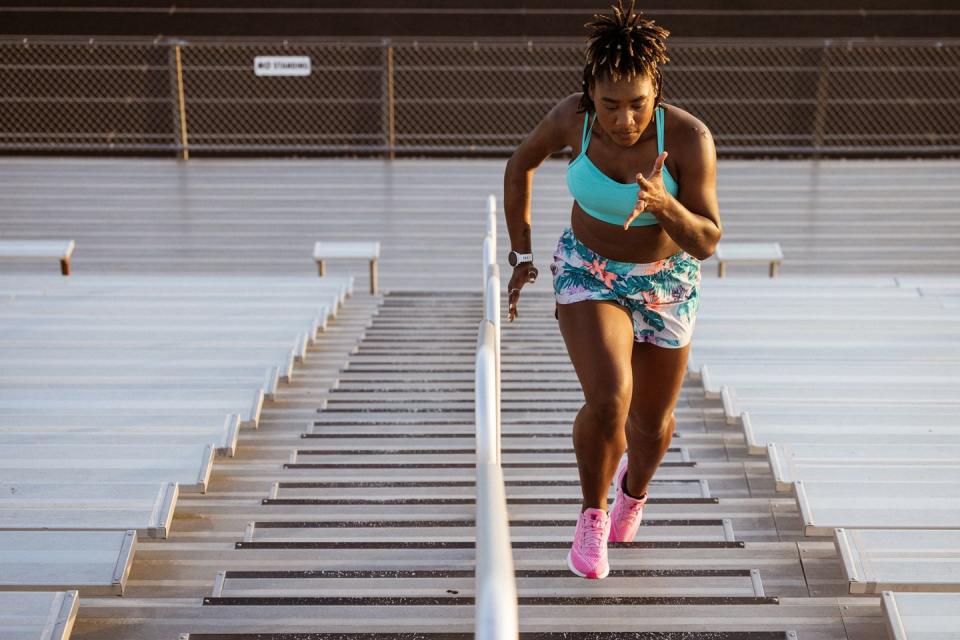
After her freshman year of high school, she focused entirely on track, namely the 100 and 200 meters. That’s when the winning started. Despite her injury, which affects her range of motion in her shoulder and the way she pumps her right arm (it’s more of a back-and-forth movement across her chest, rather than up and down), she was fast: By her senior year, she ranked among the top 20 in notoriously competitive Texas for the 200 meters, with a time of 24.50.
When it came to choosing a college, Deja was determined to get a track scholarship. But she says schools were reluctant to take her because of her disability. She remembers hearing a high school coach question her efforts: “Why would anyone want to recruit you with your arm? It’s never gonna happen.” At one recruitment visit, Deja recalls a coach saying, “If I can’t fix [your arm], I don’t want it.”
She grew increasingly pessimistic about getting a scholarship until she visited Wichita State and its Division I track and field program. When the coach asked which leg she wanted to run in the 4x100-meter relay, she knew she had found her new home. She received a full ride and moved to Wichita that fall.
“She was excited to be there, a great teammate, a joy to be around, determined, stubborn, almost every quality a successful athlete has to have,” says Becca Fitzgerald, who was an assistant trainer with the program while Deja was there. When working on Deja’s training plan, Fitzgerald says, “It wasn’t that she had something wrong, it was, ‘What can we do to make you successful?’” Success came quickly. Her 2015 4x100-meter team still holds the school record with a time of 44.30.
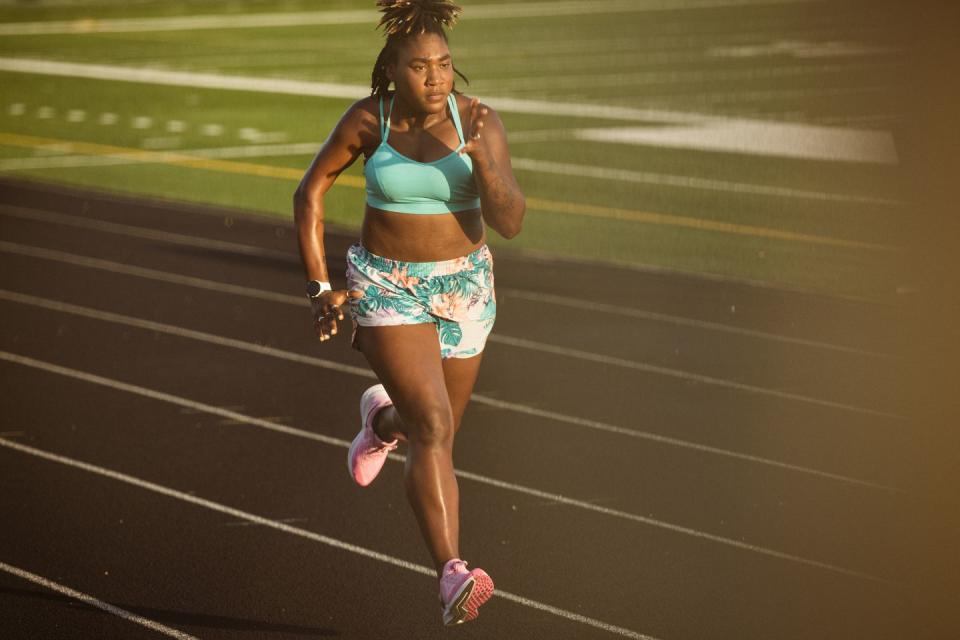
It’s an unsurprisingly hot June day in Mesquite, and Deja has just returned from Team USA’s Paralympic track and field trials in Minneapolis. She lost both races to Brittni Mason, a relative newcomer and fierce competitor who’d broken Deja’s 100-meter world record by .03 second, a day after Deja had set it, at the same 2019 meet. Mason has Erb’s Palsy, a brachial plexus injury that manifests similarly to Deja’s in the movement across her chest as she sprints. The two women don’t have much of a relationship to speak of, as they train in different places, but Deja embraces the presence of a new rival: “Iron sharpens iron,” she says. “If she gets better, I get better. I’d rather hear our anthem than anybody else’s.”
While Deja is fairly sure she’s made Team USA for Tokyo, new COVID-19 rules and protocols have thrown the field into uncertainty. The Young family follows a Zoom link into a room with the other track and field competitors at the trials. They wait for Deja’s name to be called, an announcement that will signify her place on the Paralympic team and her chance to defend her double Paralympic gold medals in the 100 and 200 meter.
“Deja Young,” the announcer finally reads from a list. The family breathes a collective sigh of relief. Deja texts her coach, Joaquim Cruz: “We can get started now.”
Deja’s path to Paralympic glory was almost an afterthought. She’d already been competing successfully as a freshman at Wichita State when she learned that her disability meant she might be able to qualify. In Paralympic competition, track and field is divided into 10 impairment types—eight physical, one vision-related, and one intellectual. An impairment must have an impact on performance for an athlete to be eligible. Deja is categorized in T47, as an athlete “with a unilateral upper limb impairment resulting in some loss of function at the shoulder, elbow and wrist,” according to World Para Athletics.
Deja says her first Para event, the 2015 U.S. Paralympic National Championships in St. Paul, Minnesota, was life-changing. For the first time, she found herself in a sea of nontraditional athletes who looked and performed like her. “Finally, people understood who I was, the struggles I’ve gone through,” she says. “I found my community and my family. I went through an identity crisis up until then.”
That fall, she made her way to Worlds in Doha where she clinched gold and silver in the 100 and 200 meters in her class, then earned a spot on Team USA for the 2016 Paralympic Games in Rio the following summer.
Despite her successes, Deja was struggling emotionally. The pressure of suddenly prepping for competition at the world level combined with, among other things, a rigorous pre-med course load and isolation from her college teammates while she traveled, became too much.
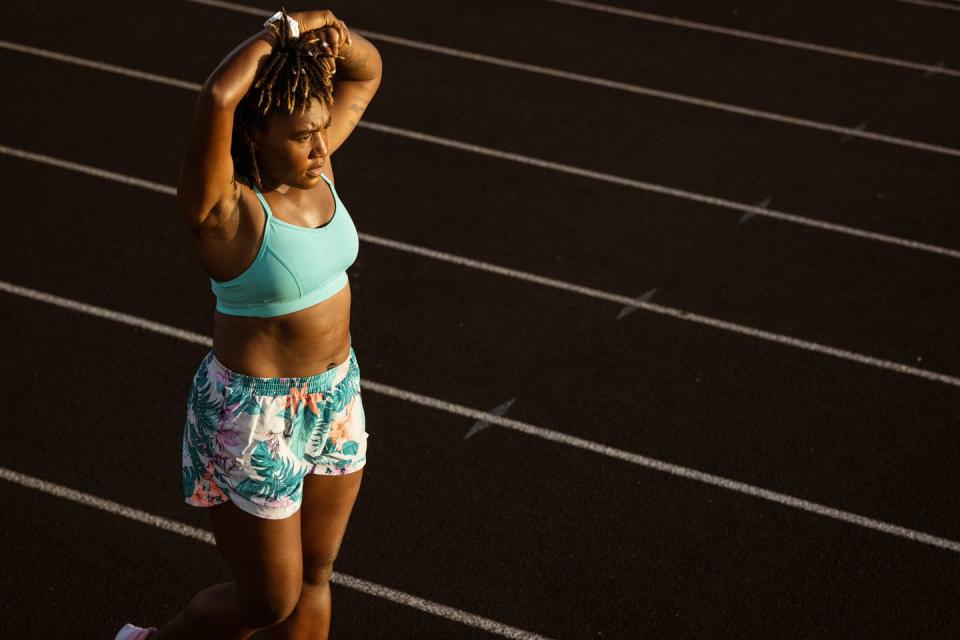
For professional athletes, perceived weaknesses run counter to how they are expected to behave, and many try to uphold a facade of perfection because of sponsorships and media scrutiny. “I have this persona of trying to be perfect,” Deja says. “At first, I was like, ‘Oh, my imperfection is what makes me perfect, it makes me who I am. And then [when I got into Paralympics] I was like, oh crap, everyone has a disability.’” Running, which had once been a salve, was now causing anxiety. Depression set in. She didn’t want to burden anyone, so she tried to push through. But two months before the Rio Games, Deja’s mother got a call from a hospital. Deja had attempted to take her own life.
Deja spent several days in the facility’s psychiatric unit, where she began the process of confronting her depression. She acknowledges that many Black women don’t seek help for a multitude of reasons. She says she searched high and low for a Black woman therapist after her hospitalization, but she never found one nearby: “It’s almost like they’re unicorns.”
Still, Deja worked hard in therapy, and she says the two months between her suicide attempt and the Rio Paralympics were some of her happiest. In September 2016, she stood on the podium in Rio with gold medals in the 100 and 200 meters.
But three months after Rio and five months after her suicide attempt, Deja found herself in a hospital bed again. She’d been driving to Wichita on a rainy morning to get to practice on time when her car hydroplaned then flipped four times. Her injuries, which included severe bone bruising and nerve damage, required extensive rehab. By the time she was cleared to resume training in January for her outdoor season, she had lost her base fitness.
Then an acquaintance casually remarked on her post-accident weight gain. Deja is open about her history of body dysmorphia as well as her periods of both restrictive eating and binging and purging. This comment, at a time when she was already vulnerable, caused those behaviors to recur. She needed to double down in therapy and deal with her complex relationship with food.
The accident also catalyzed Deja to go fully public with her depression and suicide attempt after a reporter asked about her current state. “I want to talk about this, because this sucks,” she says. With the help of her academic advisor, she organized a mindfulness month at Wichita State to destigmatize mental health. “I had a lot of support. A lot of people came forward [and thanked me],” she says. “I wasn’t sacrificing myself, but I put myself out there to help others.”
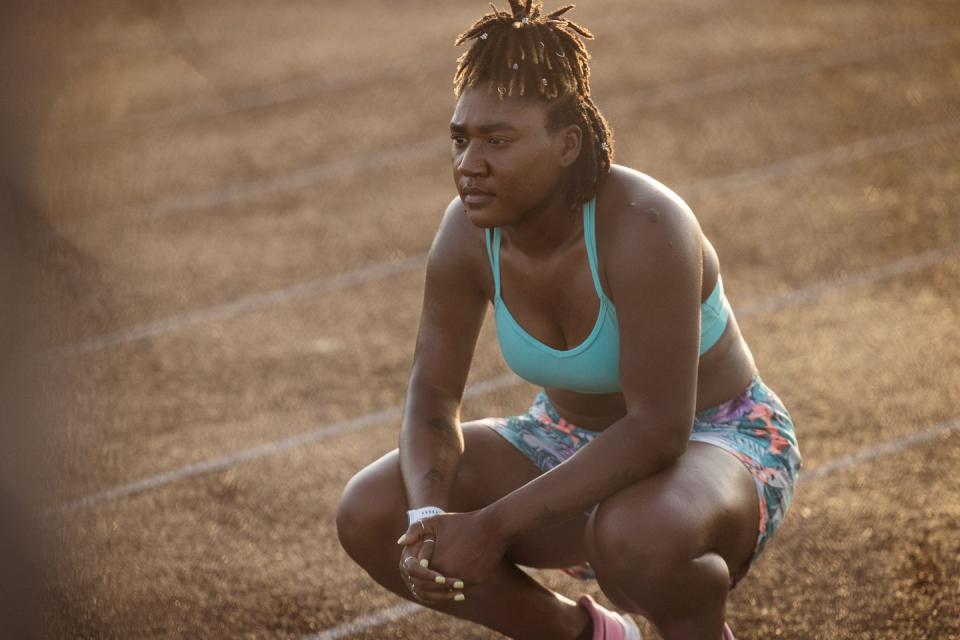
She finished classes online and began training again in January for Para competition. She was simply happy to be alive when she traveled to London for the World Para Championships in July of 2017, without expectation. Mere months after her accident, Deja won two gold medals in front of her mom and a sold-out crowd.
The next two and a half years were marked by milestones for Deja on and off the track: After switching majors from pre-med to social work, she graduated from Wichita State in 2018. She won gold in the 200 meters and silver in the 100 meters at the World Para Athletics Championships in Dubai in 2019, and she also met and fell in love with Tim Craddock, a supply technician with the National Guard who Deja describes as a “trilingual master gardener” and her perfect counterpart. The two clicked on just about everything: “We were finishing each other’s sentences, we were liking the same things, we had the same glasses, everything,” Deja says.
In March 2020, it was business as usual at the Chula Vista Elite Athletic Training Center, where Deja had moved to train with Cruz. She began to hear whispers of meets and games getting canceled because of a virus. “Next thing you know, the whole world shut down,” she says. Weeks later, the Paralympic games were postponed. Despite the uncertainty, Deja welcomed the break. “I was mentally tired, drained, overwhelmed,” she says.
Deja wound up with COVID herself in July. “Tim would wake me up, feed me, take me to the bathroom, and then take me back to bed. I couldn’t do anything,” she says. Weeks after her diagnosis, she remembers walking down the street and feeling absolutely drained. September came, and she was back at square one. “I thought, this is going to be a journey,” Deja says with a laugh.
Meanwhile, she was still dealing with the emotional aftershocks of the murder of George Floyd back in May. “It was overwhelming,” Deja says. She feared for the Black men in her life. “Every day I feel like I see [reports of] someone murdered or assaulted. I’m so tired of all that trauma,” she says.
In a world where professional athletes are seen as little else, Deja is emphatic that she is an athlete second, a Black woman and a human first. “Obviously when you see someone in a Team USA uniform, they’re a Team USA athlete. But no. You see me, and I’m a Black Team USA athlete. Which is hard for me to think about. But it’s something we have to talk about.”
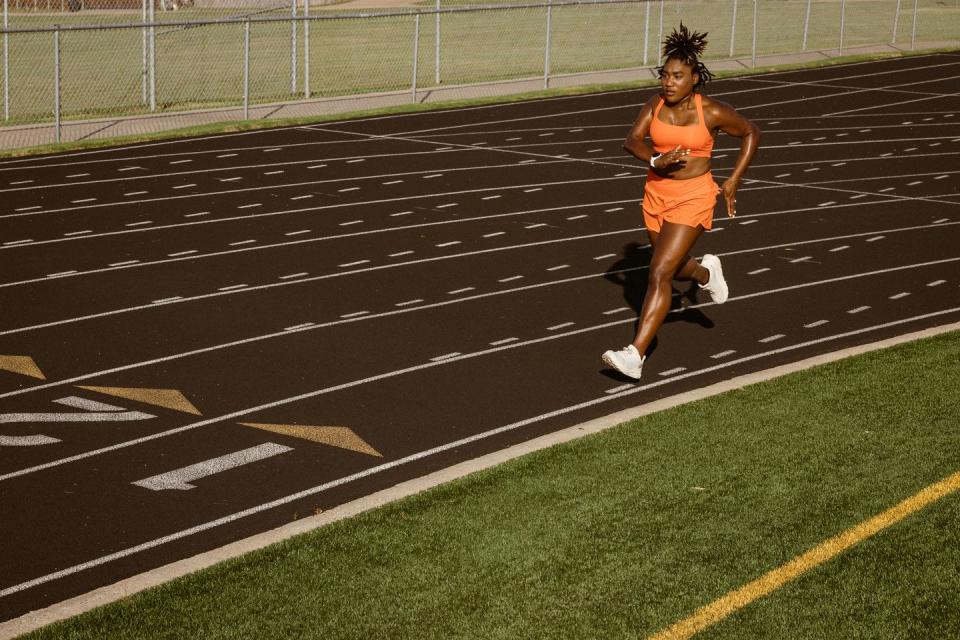
Prior to Tokyo, the IOC somewhat relaxed its Rule 50 guidelines to allow for political demonstration in certain circumstances, such as interviews. Still, the ban on protests—including wearing Black Lives Matter apparel—is strictly enforced in any Olympic site “to protect the neutrality of sport.” Historically, athletes have been suspended and livelihoods have been lost through cut sponsorships if the rule is breached. Deja says she fully supports the athletes who protest at the Olympics. Though the IPC has a similar rule, she says she isn’t opposed to protesting herself, and has discussed the possibility with her team if something were to happen leading up to the games.
To reflect on life in 2020 is to reflect on three epidemics—mental health, COVID-19, and systemic racism. Deja has an intimate relationship with all three.
She tries to focus on the positive aspects of 2020 and life overall, but when it comes to her mental health, she admits that every day is different. Some days feel like an uphill sprint into a headwind, while others are much easier. And that’s okay. Deja wants people to know that mental health recovery isn’t linear. “It’s hard,” she says.
Despite everything, Deja says that “2020 was almost the happiest I’ve ever been. Because I was able to become not just ‘Deja track and field,’ but Deja who had other hobbies and could do other things. I could find myself off the track.”
She has learned to focus on living in the present. She and Tim got married this past March, and she enjoys family time and married life in Texas when she’s not at Chula Vista.
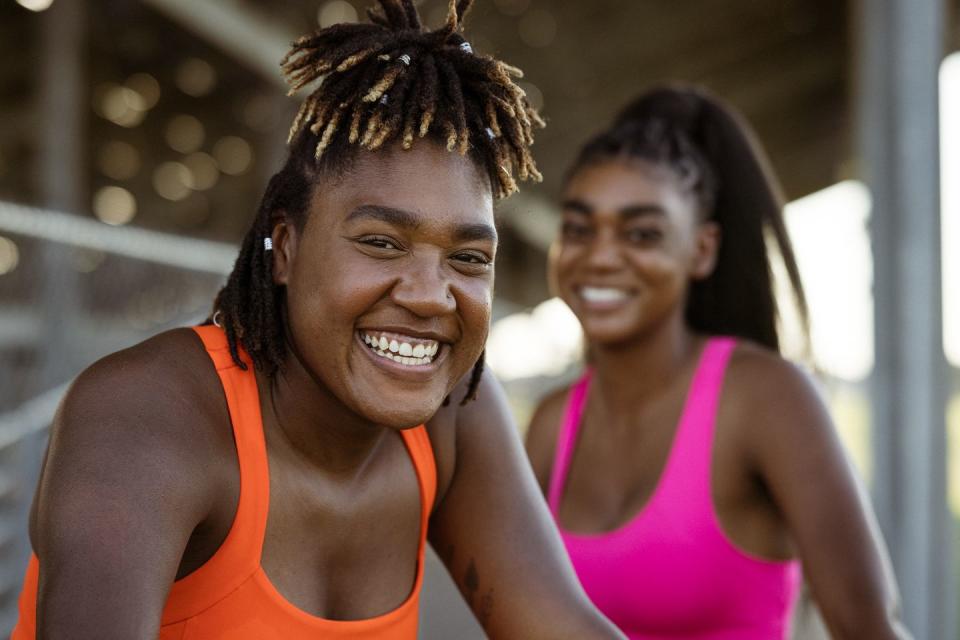
Deja isn’t sure what the future will bring. “I’m not going to be able to run forever,” she says. “And the after-Games blues are real. I don’t want to go through that.”
Fortunately, she has learned to prioritize self-care. “You have to work on your mental health, just like your physical health,” Deja says. She adamantly takes a half hour for herself each day. “Taking that time, that’s the best time that I have.”
One habit she’s developed since middle school is releasing her feelings through her artwork. “If I’m feeling really crappy, I draw, and it may be dark and sad, but that’s how I feel.” She prefers pen and simple line work. “Finding that one thing helps. It used to be running, but then I realized it was my career,” she says. “It can’t be the only thing that makes me happy.”
As for her relationship with her body, she writes affirmations in her journal every morning, one of which recently read, “I am not defined by the number on a scale.” She similarly makes a habit of writing down her intentions in her gratitude journal every night. “Focusing on those small things helps me stay grounded. It’s easy to get caught up in the big things.” Today she enjoys a healthier relationship with food and still works with a nutritionist.
Although her long-term career plans are still fuzzy, she does know she wants to use her platform to help others. “What I [want to do] is so much bigger than the sport,” Deja says. “Mental health is just as important as physical health. That’s something I want to push for. Hopefully when I’m done, I can advocate more.”
Through the Paralympics, Deja traveled to Nigeria in 2019 as a Sports Envoy to the U.S. Embassy in the wake of that country’s passage of its Discrimination Against Persons with Disabilities Act. The program teaches disabled children in developing countries how to use sport to succeed. She met and played with schoolchildren and provided a much-needed role model for kids with disabilities. Many of the places Deja visited there, she notes, were inaccessible to people with wheelchairs.
After races wrap and medals are given out in Tokyo, Deja will take on a similar role in Japan, albeit virtually due to the recent rise in COVID cases. The U.S. Embassy there reached out to her to help raise awareness about mental health in a country that has long stigmatized mental illness. Suicide rates among women in Japan increased by nearly 15 percent between 2019 and 2020. “I [want to be] that person that I needed at my lowest point,” Deja says.
Between training and racing in Tokyo (Deja races the 100 meters on August 31 and the 200 meters on September 4), she plays Pokémon Go (“I know Japan has the best Pokémon!”), eats as much ramen as she can, and practices the little bit of Japanese she’s learned through Duolingo. While she has a personal mission to explore Japan and its culture, the pandemic has limited her opportunities. But her primary objective is clear: “We’re not going to get second,” Cruz states plainly.
For the first time ever, NBC will broadcast the Tokyo Paralympics during prime time (August 24–September 5), giving the Games and athletes like Deja unprecedented visibility. Someone as close to her hometown as Dallas or as far away as Denmark will watch Deja run, ending her sprint with that infectious smile her mother remembers from when she was just a little girl in a cast.
The National Suicide Prevention Lifeline provides 24/7, free and confidential support for people in distress, as well as prevention and crisis resources for you or your loved ones. Call 1-800-273-8255.
You Might Also Like

